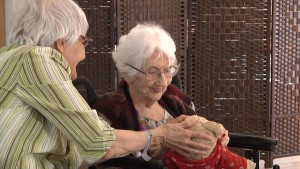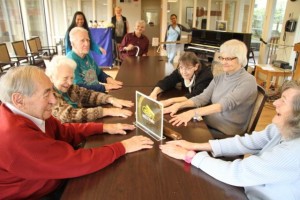Although many kinds of interventions are used for those living with dementia, a lack of evidence often undermines their effectiveness. In a systematic review of 363 qualitative studies, the authors of a 2015 research article identified 5 processes, or ‘active mechanisms’ that appear to contribute to change.1 Briefly, these 5 mechanisms include:
1. Storytelling and re-telling: this process contributes to changes in a number of ways including a means by which to reinforce social identity and integrate difficult life events.
2. Gaining new information about dementia: change occurs for carers as a result of learning new things about the person behind the dementia and for those with dementia, new strategies for coping.
3. Enabling openness and acceptance: gaining greater openness and acceptance of difficult emotions appears relevant to both those with dementia and carers.
4. Continuity of identity: processes which help individuals integrate difficult experiences with the past, present and future may be beneficial.
5. Peer identification, support and membership: those with dementia value peer support and sharing experiences with others in the same situation.
Details about these processes can be found in the research article (abstract) but peer support as an intervention, warrants more attention for a number of reasons.
Peer Support as an Intervention
 Peer support is an emerging and important foundation to the delivery of psychosocial care. But why is peer support gaining so much interest in senior living?
Peer support is an emerging and important foundation to the delivery of psychosocial care. But why is peer support gaining so much interest in senior living?
Losing independence and control is a fear that many share. Moving into residential care, whether it is a care home, assisted living or retirement home can be a stressful and emotional event.2 There is an emerging body of research that documents the effectiveness of peer support groups in fostering a sense of belonging as well as reducing loneliness and depression.3
A strong sense of belonging not only increases the likelihood of being happy, but it is also associated with better self-reported physical and mental health.4 Participating in a peer support group benefits new residents by giving them a sense of control, knowledge and confidence as well as giving them emotional and practical support.
In their review, the authors in this article found that that those with dementia who attend peer support programs valued the sharing of their experiences with their peers. This was in contrast to the ‘passivity’ of their home life. It removed the needs to explain things or worry about ‘looking silly’ (p.98).
As Steve Moran noted in his ‘Changing Aging’ blog, one of the problems with senior living is the fundamental principal of self-determination which perpetuates a cruise ship mentality—getting everything you want. While that sounds like a good idea, research tells us that our elders are happier and healthier when they contribute and help others. As opposed to ‘being entertained until they die’.
The Cost Benefits of Peer Support
 Peer support groups are also a cost effective approach as they can be easily facilitated by existing recreation staff, and by volunteers, family and residents themselves.
Peer support groups are also a cost effective approach as they can be easily facilitated by existing recreation staff, and by volunteers, family and residents themselves.
Providing these groups as a regular program allows new residents to gain self-esteem and to increase their engagement in helping others in their community.
In addition, inviting prospective new residents to sit in on your peer support groups can immediately connect them with their prospective new neighbors and decrease adjustment anxiety. Show them happy residents, happy family, a happy home. Win, win, win.
Submitted by Kristine Theurer, MA (Gerontology), Founder, Java Music Club, Inc.
References
1Dugmore, O., Orrell, M., & Spector, A. (2015). Qualitative studies of psychosocial interventions for dementia: A systematic review. Aging & Mental Health, 19(11), 955-967. doi: 10.1080/13607863.2015.1011079
2Brownie, S., Horstmanshof, L., & Garbutt, R. (2014). Factors that impact residents’ transition and psychological adjustment to long-term aged care: A systematic literature review. International Journal of Nursing Studies. doi: 10.1016/j.ijnurstu.2014.04.011
3Theurer, K., Wister, A., Sixsmith, A., Chaudhury, H., & Lovegreen, L. (2012). The development and evaluation of mutual support groups in long-term care homes. Journal of Applied Gerontology, 33(4), 387-415. doi: 10.1177/0733464812446866
4Sladowski, P. S., Hientz, M., & MacKenzie, R. (2013). Volunteering: A catalyst for citizen engagement, social inclusion, and resilient communities. The Philanthropist, 25(1).
